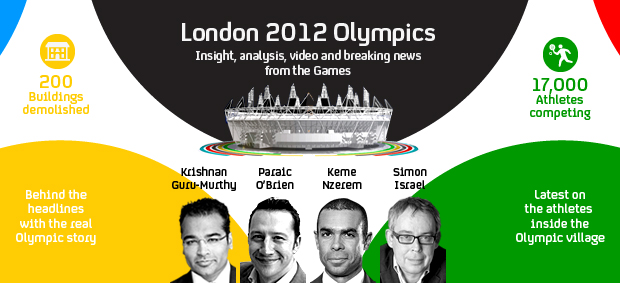Empty Games seats prompt ticket probe
An urgent investigation is launched after Olympic fans express disappointment at the sight of rows of empty seats at most of the venues on the first day of the London 2012 Games.

Gaps were visible at a number of venues, including the Aquatics Centre where British medal hope Hannah Miley missed out on a podium place.
In contrast, huge crowds lined the streets, where tickets were not required, to watch Mark Cavendish and Team GB compete in the cycling road race.
Locog, London Games organising committee, has said that many of the unoccupied seats were in “accredited” areas of the stadiums, reserved for members of the “Olympic family”.
‘Very disappointing’
Culture Secretary Jeremy Hunt said the empty seats were “very disappointing” and suggested they could be offered to members of the public.
He added: “I was at the Beijing Games, in 2008, and one of the lessons that we took away from that is that full stadia create the best atmosphere. It’s best for the athletes, it’s more fun for the spectators. It’s been an absolute priority.
Full stadia create the best atmosphere. It’s best for the athletes, it’s more fun for the spectators. Jeremy Hunt, culture secretary
“Locog are doing a full investigation into what happened. I think it was accredited seats that belonged to sponsors, but if they’re not going to turn up, we want those tickets to be available for members of the public because that creates the best atmosphere.
“We are looking at this very urgently at the moment.”
Photo gallery: Empty seats on day one of London 2012
Wimbledon system
Mr Hunt said a system had been introduced for these Olympics similar to the one used at Wimbledon, where people coming out of the stadium handed on their tickets so the seats could be made available to other people.
“So we are trying a lot of innovations, it’s a shame this happened, but we are going to do everything we can to make sure we fill up these stadia.”
Gaps in the seating were also visible at the gymnastics, handball, volleyball, badminton and basketball arenas yesterday.
The cheaper seats higher in the stands were mostly full but those lower down, which are generally more expensive, were not filled.
Olympics supremo Lord Coe has called for the row over empty venues to be kept in perspective.
He admitted that there were steps could be taken to improve the situation, but added that it was still early days.
Naming and shaming
Asked if sponsors who failed to turn up would be named, Lord Coe said: “I’m not sure naming and shaming is what we’re in to at the moment.
“I don’t think you will be seeing this as an issue long-term into the Games.”
“There are tens of thousands of people at this moment within the accredited family who are trying to figure out what their day looks like, where they’re going to be asked to go to. Frankly just working out how you’re going to divide your time.”
He added that some 150 students and teachers from the local area were brought in to fill empty seats yesterday and an extra 1,000 tickets were sold to try to fill venues.
Locog’s communication chief, Jackie Brook-Doyle, told Channel 4 News’s Paraic O’Brien that she would have a look at photographs taken by fans at last night’s gymnastics which showed empty seats to see if they could identify which part of the venue they showed.
But she added “the sponsors are coming out in the drove, as are members of the public”.
Games sponsors have moved quickly to defend themselves against accusations that they left their ticket allocations unused.
Sponsors’ defence
A statement from games sponsor Coca Cola said that it had given the majority of the London 2012 tickets to the public via competitions and promotions, with the remaining going to longstanding partners, employees, and customers.
“All of our guests are incredibly excited to be able to be a part of London 2012 and we believe that usage levels of our tickets have been extremely high so far,” the statement added.
A statement from healthcare company Procter & Gamble said the vast majority of our ticket allocation has been given to the mums and families of Olympians and to consumers through competitions and promotions in stores. “We hope they all make it to the Games,” the statement added.
Adidas has insisted that it took fewer tickets than it was entitled to as a sponsor. “We fully intend to use the ones we have,” its statement said. “For example even if a ticket becomes available at the last minute where possible we will use our social channels to allocate it immediately.”
Mark Adams, of the International Olympic Committee, said: “It’s completely wrong to say this is a sponsors issue.”
Those who failed to turn up yesterday were sports organisations from around the world, the media, “a handful of sponsors” and others, he said.
